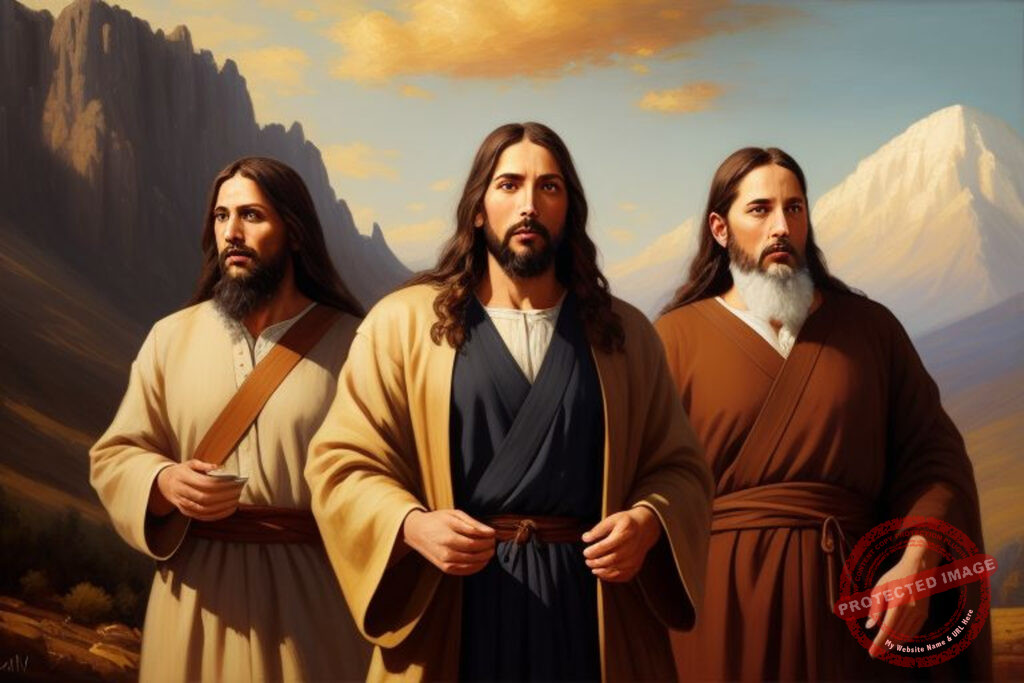
Introduction
The Bible unfolds a narrative that traverses centuries and introduces readers to pivotal covenants that shape the relationship between God and humanity. Central to this narrative are two Biblical covenant promises, the Mosaic Covenant and the New Covenant established by Jesus Christ. They stand as distinctive pillars in the theological framework of Judeo-Christian beliefs, marking crucial moments in the unfolding divine plan.
In today’s blog post, we will delve into an exploration of the Mosaic and New Covenants. It is imperative that we understand their origins, purposes, and the profound differences that distinguish them in order to shed light on the transformative nature of God’s covenantal relationship with humanity.
The Mosaic Covenant
The Mosaic Covenant is a significant biblical covenant between God and the Israelites, named after Moses, the central figure through whom it was established. This covenant is detailed in the Old Testament, particularly in the Book of Exodus, and is considered a pivotal moment in the history of the Israelite people.
The Mosaic Covenant was established on Mount Sinai after the Israelites’ escape from slavery in Egypt. According to the biblical narrative, Moses ascended the mountain and received the Ten Commandments – a set of moral and ethical principles – directly from God. These commandments formed the core of the covenant, outlining the moral and religious obligations the Israelites were to follow.
The Ten Commandments
The Ten Commandments contain the terms of the first of God’s Biblical covenant promises. The Bible spells them out in Exodus 20: 1-17:
And God spoke all these words, saying, “I am the LORD your God, who brought you out of the land of Egypt, out of the house of slavery.
1. You shall have no other gods before me.
2. You shall not make for yourself a carved image, or any likeness of anything that is in heaven above, or that is in the earth beneath, or that is in the water under the earth.
3. You shall not bow down to them or serve them, for I the LORD your God am a jealous God, visiting the iniquity of the fathers on the children to the third and the fourth generation of those who hate me, but showing steadfast love to thousands of those who love me and keep my commandments.
4. You shall not take the name of the LORD your God in vain, for the LORD will not hold him guiltless who takes his name in vain.
5. Remember the Sabbath day, to keep it holy. Six days you shall labor, and do all your work, but the seventh day is a Sabbath to the LORD your God. On it you shall not do any work, you, or your son, or your daughter, your male servant, or your female servant, or your livestock, or the sojourner who is within your gates. For in six days the LORD made heaven and earth, the sea, and all that is in them, and rested on the seventh day. Therefore the LORD blessed the Sabbath day and made it holy.
Honor your father and your mother, that your days may be long in the land that the LORD your God is giving you.
6. You shall not murder.
7. You shall not commit adultery.
8. You shall not steal.
9. You shall not bear false witness against your neighbor.
10. You shall not covet your neighbor’s house; you shall not covet your neighbor’s wife, or his male servant, or his female servant, or his ox, or his donkey, or anything that is your neighbor’s.”
Laws, Statutes, and Ordinances
In addition to the Ten Commandments, the Mosaic Covenant included a comprehensive set of laws, statutes, and ordinances that covered various aspects of the Israelites’ lives. These laws, often referred to as the Mosaic Law or the Law of Moses, covered areas such as religious practices, social justice, dietary regulations, and civil matters. The covenant established a framework for the Israelites to live in accordance with God’s will and to maintain a unique relationship with Him.
Conditional Nature
The Mosaic Covenant was characterized by a conditional nature – the blessings and prosperity promised by God were contingent upon the Israelites’ obedience to the covenant stipulations. If they followed the commandments and laws, they would experience God’s favor and protection. However, disobedience would result in consequences, including divine judgment and punishment.
The Ark of the Covenant, a sacred container that housed the tablets inscribed with the Ten Commandments, symbolized the presence of God among the Israelites and served as a focal point for their worship.
Transition to the New Covenant
In Christian theology, the Mosaic Covenant is seen in the context of the broader biblical narrative. The New Testament describes the second of God’s Biblical covenant promises with Jesus Christ as the fulfillment of the law. This New Covenant is based on grace and faith and comes as a gift from God through the life, death, and resurrection of Jesus.
The New Covenant is a central concept that represents a transformative relationship between God and humanity, mediated through Jesus Christ. The idea of the New Covenant is primarily derived from passages in the New Testament of the Bible, particularly in the Gospels and the letters of the apostles.
Contrasting the Biblical Covenant Promises
The contrast between the Old Covenant and the New Covenant lies at the heart of Christian theology, symbolizing a transformative shift in the relationship between God and humanity. The Old Covenant, established through Moses and the Mosaic Law, is characterized by external regulations and rituals, primarily focused on obedience to commandments.
In contrast, the New Covenant, inaugurated by Jesus Christ, emphasizes internal transformation and is marked by forgiveness of sins through faith in Christ’s sacrificial death.
Temporary Versus Permanent Nature
The Old Covenant’s temporary nature and dependence on human adherence to laws stand in stark contrast to the New Covenant’s permanence and reliance on God’s grace. While the Old Covenant was exclusively directed at the Israelites, the New Covenant extends universally, breaking down barriers and offering an intimate connection with God through the indwelling of the Holy Spirit and the internalization of divine laws within the hearts of believers.
The transition in Biblical covenant promises signifies a shift from legalistic obedience to a relationship centered on grace, faith, and the transformative power of Christ’s redemptive work.
Key Aspects of the New Covenant
Key aspects of the New Covenant include:
Established by Jesus
The New Covenant is seen as being established by Jesus Christ through His sacrificial death on the cross. Jesus, often referred to as the “mediator” or “covenantal head,” inaugurated this new relationship between God and humanity.
Forgiveness of Sins
A central theme of the New Covenant is the forgiveness of sins. Jesus’ death is believed to atone for the sins of humanity, providing a way for reconciliation with God. This forgiveness is offered through faith in Jesus Christ.
Internal Transformation
Unlike the external laws and regulations of the Old Covenant, the New Covenant emphasizes an internal transformation of the heart. The Holy Spirit is believed to be given to believers, enabling them to live according to God’s will and empowering them to lead righteous lives.
Universal Application
While the Old Covenant was primarily established with the Israelites, the New Covenant is seen as universal in its scope, extending to people of all nations. It is not bound by ethnic or cultural distinctions.
Key Biblical Passages that Reference the New Covenant
Jeremiah 31:31-34
In the Old Testament, the prophet Jeremiah anticipates a new Biblical covenant promise that God will make with the people, one that involves writing His law on their hearts.
31 “Behold, the days are coming, declares the LORD, when I will make a new covenant with the house of Israel and the house of Judah,
32 not like the covenant that I made with their fathers on the day when I took them by the hand to bring them out of the land of Egypt, my covenant that they broke, though I was their husband, declares the LORD.
33 For this is the covenant that I will make with the house of Israel after those days, declares the LORD: I will put my law within them, and I will write it on their hearts. And I will be their God, and they shall be my people.
34 And no longer shall each one teach his neighbor and each his brother, saying, ‘Know the LORD,’ for they shall all know me, from the least of them to the greatest, declares the LORD. For I will forgive their iniquity, and I will remember their sin no more.”
Matthew 26:26-28; Mark 14:22-24; Luke 22:19-20
These passages describe Jesus instituting the Lord’s Supper or Communion, where He speaks of the cup as the “blood of the covenant” in the context of the new covenant. All three versions are similar. Here is Matthew’s account:
Matthew 26:26-28
26 Now as they were eating, Jesus took bread, and after blessing it broke it and gave it to the disciples, and said, “Take, eat; this is my body.”
27 And he took a cup, and when he had given thanks he gave it to them, saying, “Drink of it, all of you,
28 for this is my blood of the covenant, which is poured out for many for the forgiveness of sins.
Hebrews 8:6-13
The book of Hebrews in the New Testament extensively discusses this new Biblical covenant promise, highlighting its permanence and effectiveness. In it, the author references Jeremiah 31:
6 But as it is, Christ has obtained a ministry that is as much more excellent than the old as the covenant he mediates is better, since it is enacted on better promises.
7 For if that first covenant had been faultless, there would have been no occasion to look for a second.
8 For he finds fault with them when he says:
“Behold, the days are coming, declares the Lord,
when I will establish a new covenant with the house of Israel
and with the house of Judah,
9 not like the covenant that I made with their fathers
on the day when I took them by the hand to bring them out of the land of Egypt. For they did not continue in my covenant,
and so I showed no concern for them, declares the Lord.
10 For this is the covenant that I will make with the house of Israel
after those days, declares the Lord:
I will put my laws into their minds, and write them on their hearts,
and I will be their God, and they shall be my people.
11 And they shall not teach, each one his neighbor
and each one his brother, saying, ‘Know the Lord,’
for they shall all know me, from the least of them to the greatest.
12 For I will be merciful toward their iniquities,
and I will remember their sins no more.”
13 In speaking of a new covenant, he makes the first one obsolete. And what is becoming obsolete and growing old is ready to vanish away.
Hebrews 9:15
Hebrews 9 continues:
15 Therefore he is the mediator of a new covenant, so that those who are called may receive the promised eternal inheritance, since a death has occurred that redeems them from the transgressions committed under the first covenant.
Messianic Prophecy
Christians believe that Jesus is the Messiah who fulfills the prophecies of the Old Testament based on their interpretation of biblical texts, particularly those found in the Hebrew Scriptures. The Old Testament, also known as the Tanakh in Judaism, contains numerous prophecies that, according to Christian belief, point forward to the coming of a Savior or Messiah.
Several key reasons contribute to Christians’ conviction that Jesus is the fulfillment of these prophecies.
Prophetic Texts
The Old Testament contains numerous prophetic passages that describe the coming of a figure who will bring salvation, establish a new Biblical covenant promise, and fulfill God’s promises to His people. Christians point to passages such as Isaiah 7:14, which speaks of a virgin giving birth, and Isaiah 53, which describes a suffering servant, as prefiguring the life, death, and resurrection of Jesus.
Genealogy
The genealogies of Jesus presented in the Gospels of Matthew and Luke trace his lineage back to King David, fulfilling the Old Testament prophecy that the Messiah would be a descendant of David (2 Samuel 7:12-13).
Birth in Bethlehem
Micah 5:2 prophesies that the Messiah would be born in Bethlehem, a detail highlighted in the Gospel accounts of Jesus’ birth in Bethlehem.
Triumphal Entry
The Gospel of Matthew (Matthew 21:1-11) recounts Jesus’ entry into Jerusalem on a donkey, a scene seen as the fulfillment of Zechariah 9:9, which describes the Messiah coming in humility.
Suffering and Resurrection
Isaiah 53 and Psalm 22 are among the Old Testament passages that Christians interpret as predicting the suffering, death, and resurrection of the Messiah, a narrative central to the Christian understanding of Jesus.
Establishment of a New Covenant
As discussed above, Jeremiah 31:31-34 speaks of a new Biblical covenant promise that God will make with His people, and Christians see the institution of the New Covenant through the life, death, and resurrection of Jesus as the fulfillment of this promise.
Teachings and Miracles
Jesus’ teachings and miracles are considered in harmony with the Old Testament prophecies, reflecting the divine wisdom and power expected of the Messiah.
New Covenant as the Fulfillment of God’s Will
In the Book of Romans, the Apostle Paul explains how Jesus is the fulfillment of the Old Testament covenants. Paul argues that humanity’s disobedience to God’s law has led to sin and separation from God. However, he contends that through faith in Jesus Christ, a new covenant is established that brings justification and reconciliation.
Paul emphasizes that Jesus’ sacrificial death atones for human sin, providing righteousness for those who believe. He draws on the legacy of Abraham, asserting that faith, rather than adherence to the law, is the key to righteousness. Paul sees Jesus as the promised Seed of Abraham and the culmination of God’s plan for salvation, fulfilling the law and prophecies.
New Covenant is Universal
The Apostle Paul underscores that this new Biblical covenant promise is universal, extending to both Jews and Gentiles, creating a path to salvation through faith in Christ rather than adherence to the Mosaic Law. Overall, Paul’s argument in Romans highlights Jesus as the fulfillment of God’s redemptive promises in the Old Testament, providing a new covenant based on faith, grace, and righteousness.
Jews and the Mosaic Covenant
It is important for all believers in God to understand Biblical covenants. The Mosaic Covenant holds profound importance for observant Jews today as it represents the foundational pact between God and the Israelites, forged at Mount Sinai through the mediation of Moses. This original Biblical covenant promise, encapsulated in the Ten Commandments and the broader Mosaic Law, serves as a moral and legal guide, shaping the religious and ethical identity of the Jewish people.
Observant Jews view the covenant as a sacred bond that outlines their responsibilities and obligations to God and fellow humans, providing a framework for righteous living. The commandments encompass principles of justice, compassion, and ethical conduct, influencing daily life, communal practices, and religious rituals. Adherence to the Mosaic Covenant not only preserves a connection to the historical roots of Judaism but also fosters a sense of communal unity and a commitment to upholding divine principles in the contemporary context.
Christians and the New Covenant
For Christians, Jesus’ New Covenant is seen as the natural extension and fulfillment of the Mosaic Covenant established in the Old Testament. They believe that Jesus, through His life, death, and resurrection, brought about a new covenant that surpasses and fulfills the Mosaic Covenant.
Jesus himself proclaimed the establishment of the New Covenant during the Last Supper, where He instituted the sacrament of the Eucharist, symbolizing His body and blood given for the forgiveness of sins. Christians interpret this as a new agreement between God and humanity, where forgiveness and salvation are achieved through faith in Jesus rather than adherence to the Mosaic Law. The New Covenant, as described in the New Testament, emphasizes grace, love, and reconciliation with God through Jesus Christ, rather than the strict legalism of the Mosaic Covenant. It is viewed as the ultimate fulfillment of God’s plan for humanity’s redemption, offering a new and eternal relationship with God based on faith and grace rather than works alone. Thus, Christians see Jesus’ New Covenant as not only fulfilling but also surpassing and transforming the principles of the Mosaic Covenant, providing a deeper and more intimate connection between God and humanity through Christ’s sacrificial love.
About Raleigh Acupuncture
Acupuncture is a powerful healing modality invented in China over two thousand years ago. In our opinion, Chinese medicine is a gift from God. We are constantly amazed by acupuncture’s ability to heal sickness and resolve pain, with no adverse side effects. If you have an ailment that is not responding to Western medicine, give acupuncture a try. Our website has nearly one thousand pages of information about every condition we treat, including videos, case studies, research studies, and testimonials. Click the link below to book directly online. We look forward to working with you.
BOOK NOW to schedule an appointment online.
Meet the Practitioners (Video).
Learn about all the conditions we treat.
Focus Key Phrase: Biblical Covenant Promises
Image generated with perchance.org.




